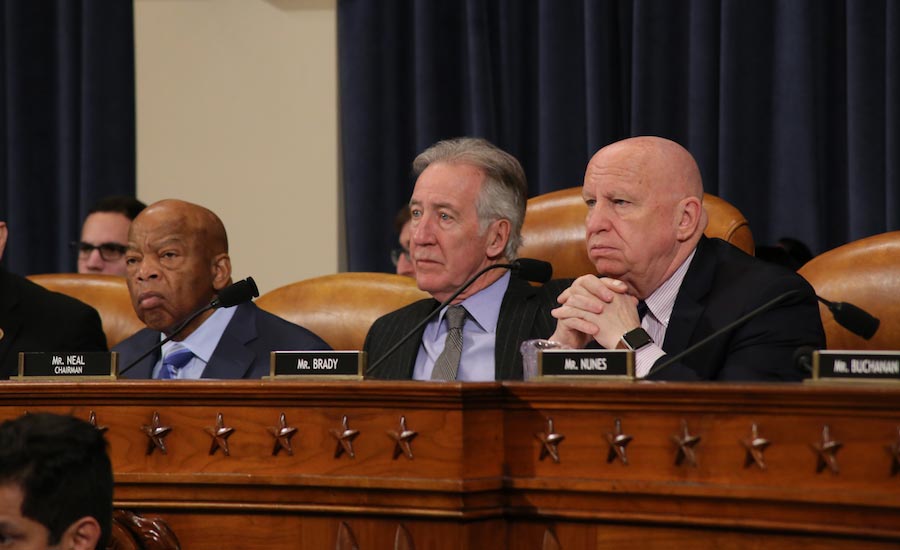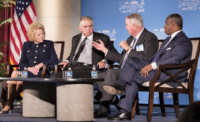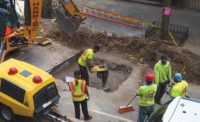The long-running Capitol Hill discussion about the need for infrastructure legislation has shifted to the House Ways and Means Committee, which would play the lead role in that chamber in devising ways to raise the large sums many say are needed to upgrade highways, bridges and other structures.
Infrastructure advocates were pleased to see Ways and Means enter the game with a lengthy March 6 hearing—the panel’s first in several years on the topic—but few, if any, new funding or financing ideas surfaced. Some witnesses called for hiking the federal gas tax; another advocated fees on vehicle miles.
In opening the meeting, Ways and Means Chairman Richard Neal (D-Mass.) said he's met with Trump Cabinet officials, who have assured him the administration will be "willing partners" in pursuing infrastructure legislation. “So I think we have a real opportunity here to work together and do something really big,” Neal added. “It’s clear that the U.S. desperately needs a robust investment…to revitalize and build new infrastructure.”
The leadoff witness, House Transportation and Infrastructure Committee Chairman Peter DeFazio (D-Ore.), said the Ways and Means hearing was “long overdue”—according to the U.S. Chamber of Commerce, the tax-writing panel’s last infrastructure hearing was in 2015.
DeFazio urged members to approve new revenue for infrastructure. “The bottom line is we need investment,” he said. “You put up the money, it’ll get done.”
DeFazio is re-introducing an earlier bill that would index the gas and diesel taxes for inflation, with the proceeds to be used to generate bonds totaling about $500 billion over 10 years.
Transportation and Infrastructure’s top Republican, Sam Graves (Mo.), indicated that there are a range of possible revenue-raisers. “Everything is on the table,” Graves told the Ways and Means members.
But he added, “To be frank, the gas tax is not a long-term solution.” The growth of more fuel-efficient and alternate-fuel vehicles has hampered motor-fuel tax collections and left the Highway Trust Fund, into which those levies flow, about $16 billion per year short in annual spending.
As he has said before, Graves made a push for a fee on vehicle-miles traveled (VMT), which he called “the most promising long-term solution” for the trust fund's revenue gap.
Neal said, “We need several tools to close the infrastructure investment gap.” He raised the subject of taxable bonds for infrastructure. That could be along the lines of the popular, federally subsidized Build America Bonds. That program was launched in 2009 and generated $181 billion before the program expired at the end of 2010.
U.S. Chamber Chief Executive Officer Thomas Donohue, another witness, said the chamber supported various types of revenue sources but underlined the importance of higher user fees. He again discussed the chamber’s proposal to raise the federal motor fuels taxes by 25¢ per gallon, a move that would produce an estimated $400 billion over 10 years. “If there’s no cash,” Donohue said, “there’s no dash.”
The American Trucking Associations also have proposed hiking the fuel taxes. ATA's idea is a five-cents-per-yea boost, which would produce $340 billion over 10 years, said ATA President and CEO Chris Spear.
Gregory DiLoreto, an American Society of Civil Engineers past president, cited ASCE's oft-mentioned estimate of a $2-trillion infrastructure investment shortfall. DeLoreto said slightly more than half of that total is in transportation.
But Marc Scribner, a senior fellow with the Competitive Enterprise Institute, said that though there are "very real infrastructure needs in the U.S.," there isn't a "broad, immediate crisis." He called for"a more targeted approach" to deal with the issue.





Post a comment to this article
Report Abusive Comment